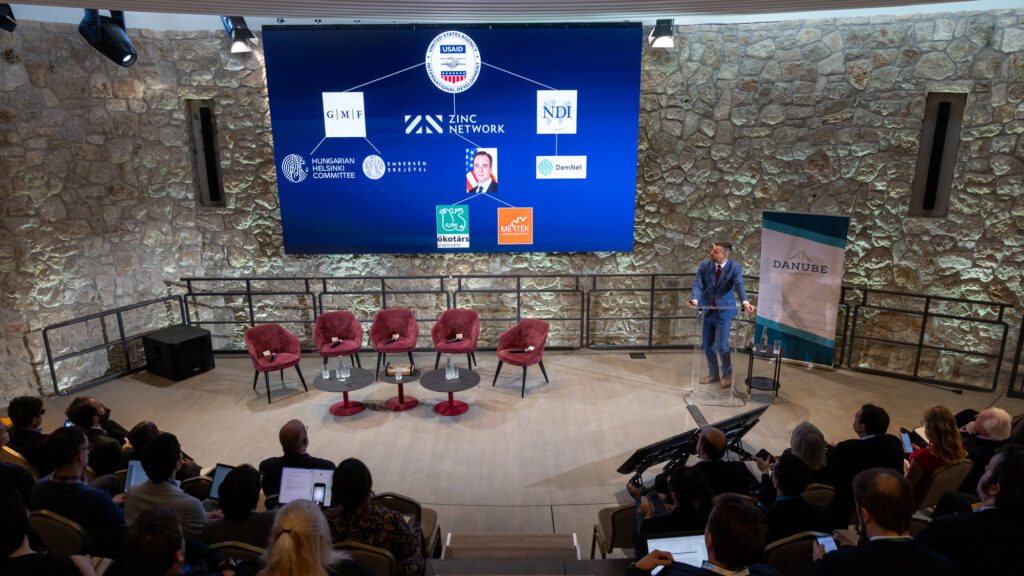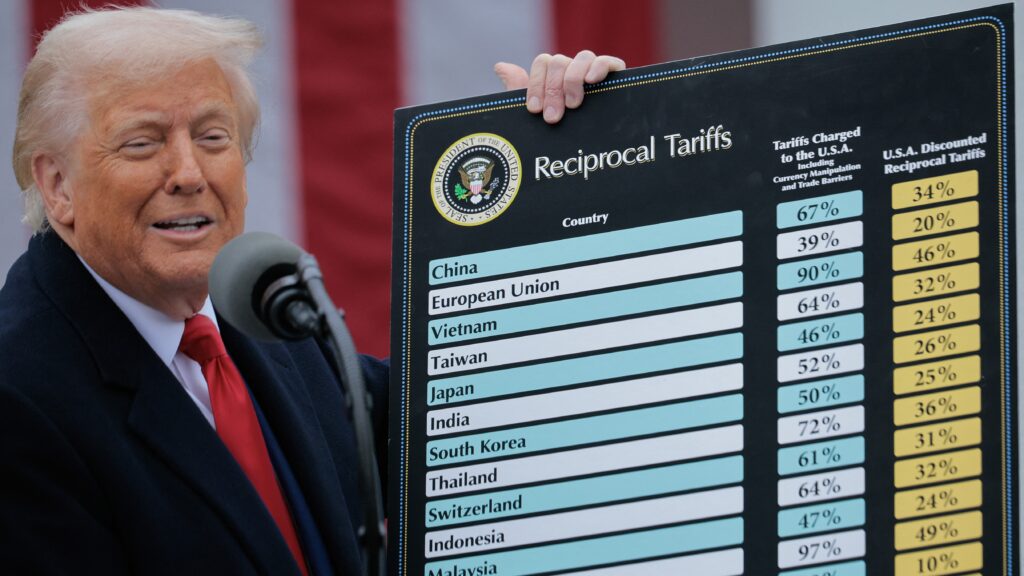Miklós Pogrányi Lovas is a Senior Fellow for the Budapest-based think tank Center for Fundamental Rights. He is also a contributor to our Hungarian Conservative print magazine. Recently, he has worked on the translation of the book The Conservative Mind by Russell Kirk, originally published in 1953, into Hungarian. He kindly gave us an exclusive interview to talk about that project.
***
Who was Russell Kirk, and what is his place in the history of American conservatism?
Russell Kirk was a remarkable American thinker of the 20th century who profoundly influenced political thought and practice in the United States—so much so that his impact can truly be considered world-historical. He shed light on the philosophical foundations of America’s moral and political order and clarified how American culture connects deeply with its European heritage. Kirk was also instrumental in sparking the conservative renaissance after the Second World War, a movement that, by the late 20th century, played a crucial role in overcoming the Soviet Union.
In fact, Kirk’s influence has become so ingrained that Americans themselves, including many conservatives, often aren’t even aware of it. His phrases, concepts, and book titles have quietly become part of the everyday vocabulary of American intellectual life. Conservatism certainly existed before Kirk, but its meaning was vague and lacked a broadly recognized intellectual framework. If today we see systematic self-reflection and therapeutic retrospection as distinctive elements in American political thought, this is very much thanks to his legacy.
What challenges did you face during the process of translating The Conservative Mind?
Let me begin by clarifying that the lion’s share of the translation was done by my colleague, Péter Lengyel Balikó. My role at the Center for Fundamental Rights was primarily that of an editor or supervising translator. I reserved for myself only those chapters that were of particular personal importance to me. Although I have experience translating scholarly texts, I do not consider myself an experienced literary translator.
One of the major challenges we faced was that many of Kirk’s key terms simply don’t have exact equivalents in Hungarian, so we had to create entirely new expressions—such as ‘prescription’. This is precisely why the book includes a translator’s foreword explaining some of our choices. Deciding on the Hungarian title also raised numerous questions. We ultimately settled on Konzervatív eszme (literally, ‘Conservative Idea’ or ‘Conservative Thought’). There were, of course, other options that could have worked as more literal translations, but we concluded that, in 2025, this title best captures the current relevance of Kirk’s work for Hungarian readers.
What significance does Kirk’s work hold for Europe? In your view, what are the main points of contact between American and European conservatism?
The term conservatism is today greatly overused and pretty much worn out—people apply it to just about anything. In Western Europe, even globalist forces now label themselves ‘conservative’, despite having abandoned the protection of unborn life, the defence of the family, and marriage. These self-styled conservatives have grown soft, compromised with the spirit of the age, and now repeat nothing but free-market mantras. They embrace the fiction known as ‘same-sex marriage’, even advocating adoption rights for homosexual couples. This capitulation has occurred throughout the entire Western cultural sphere. However, a Great Resistance against this ‘Great Reset’ is beginning to take shape. Its Western stronghold is in Washington, while its Eastern bastion is here, in Budapest. How can we bridge the roughly 4,500 miles separating these two points? By recognizing that we share the same spiritual fundamentals. Russell Kirk was, above all, an American, writing primarily for Americans, but he did so with such depth and insight that the entire Western hemisphere can—and indeed does—draw inspiration from him.
What justifies the translation of this work into Hungarian? What relevance or connection does Russell Kirk have for us, Hungarians?
There were several reasons for publishing a Hungarian translation. First, there’s a clear professional justification: The Conservative Mind is one of the foundational works that launched the conservative renaissance in America after World War II. Other key texts from this era, such as Hayek’s Road to Serfdom and Voegelin’s New Science of Politics, have already been translated—next on the wishlist is Richard Weaver’s Ideas Have Consequences. Second, in literary terms, Kirk’s mindset is very much at home in Hungarian intellectual culture. We Hungarians have a genuine affinity for the essay genre. Though culturally we belong to the German cultural tradition, our intellectual style is actually much closer to the Anglo–American essay form than to the philosophical cathedrals of German Idealism.

Third, there’s a historical debt to be repaid. During the Cold War, Hungary was isolated from the West. It wasn’t merely that we lacked access to Western consumer goods—that was the smaller issue—but rather that we were deprived of Western cultural thought. Only Marxist authors from the West managed to slip through the Iron Curtain, often producing writings even more foolish than those produced here at home, especially in a political sense. Jean-Paul Sartre was a prime example: a notable existentialist philosopher who, whenever he turned to political commentary, invariably spoke nonsense. From 1945 to 1990, countless valuable Christian and conservative authors were writing in the West, and it’s high time the Hungarian publishing industry fully caught up. In this sense, we’re living in a golden age right now—though we may fully appreciate it only later. Fourth, there is a political reason: I believe that a significant (counter-)revolutionary transformation is currently underway in the United States. We Hungarians have much to learn from their experiences. Perhaps we can avoid repeating some of their mistakes, and successfully adapt their best practices to our own circumstances. Amid the escalating hysteria of a new Cold War, we shouldn’t merely react to surface issues but pay close attention to the deeper underlying problems. Kirk himself did not merely critique liberalism or communism per se; he unveiled utilitarian thinking, which he identified as the common root leading to these ideologies. After all, the true essence of politics isn’t to dominate the moment…
‘From 1945 to 1990, countless valuable Christian and conservative authors were writing in the West, and it’s high time the Hungarian publishing industry fully caught up’
You’ve said that Kirk helped ignite the conservative renaissance in America. And yet today he seems to be something of a forgotten figure. How do you explain that?
American culture exists in the everlasting present. Their attention is constantly focused on tomorrow, and whatever happened yesterday interests only academics. Why? Because the consciousness-forming cultural industry is in liberal hands. And this is precisely the mentality of these progressive people. This timeless existence permeates the entire American public mindset, which is why they produce the same movies over and over again for each generation—for example, The Little Mermaid in 1989, then in 2023. Moreover, they even remake films specifically for themselves if they feel that the original doesn’t perfectly align with the present moment (e.g., Les Visiteurs from 1993 vs Just Visiting from 2001). The same phenomenon permeates philosophy as well: they adopt an old European idea, enhance it with charts and tables, and then sell it as their own, new idea. Samuel P Huntington did exactly this with the intellectual legacy of Christopher Dawson in his book The Clash of Civilizations and the Remaking of World Order. Huntington was at least fair enough to somewhat clarify that Dawson was the original source of the idea.
In this intellectual environment, it is self-evident that sooner or later everyone becomes a forgotten author, in some sense. Yet Kirk lives and breathes here among us: his ideas and gestures are present among intellectual conservatives in America, those who have read and continue to read him. I could go on listing examples at length, but instead, I would like to share only my latest reading experience: I’m currently reading Kevin D Roberts’s book, Dawn’s Early Light: Taking Back Washington to Save America. The opus of the president of the Heritage Foundation is pleasantly Kirk-inspired, something the author explicitly shares with us right at the beginning. It is wonderful to see a second conservative renaissance beginning to emerge in America, following in the footsteps of the great Catholic thinker.
‘It is wonderful to see a second conservative renaissance beginning to emerge in America’
The Conservative Mind was published by Kirk in 1953. The real social divide between liberals and conservatives in the US came about 15 years later, during the ‘hippie revolution’ of 1968. What can you tell us about that?
I don’t think Kirk really cared about what the hippies were doing at the time, as everyone could just assume what his opinion was on the matter. In 1968, all this only became visible to the public, the movement itself started in the 1950s. One of the main issues was the introduction of commercially available contraceptives to the market. The AIDS epidemic only started decades later. Between the two events, this ‘free love’ movement really flourished. Whatever people were doing in secret, and what people were really careful about doing to avoid making a baby—all of a sudden, all that ended. Because, simply put, women too had the opportunity to engage in one-night affairs relatively risk-free, which they previously would have thought through dozens of times. This completely changed sexual habits in America, and the whole of society started to adjust.
There are still many people who consider themselves conservatives, but on sexual matters, they are completely liberal. They basically have the same positions as the far left in the 1960s. Because that is the way life is comfortable for them. There is also a broader division of being liberal in one’s personal life while posting conservative things on Facebook. This started back then, but there still was a sort of discipline about it. For example, the so-called neo-conservatives—who were basically a friend group of Trotskyists, non-religious people from Jewish backgrounds—were quite left-wing, while also being quite conservative in their personal lives. It’s one thing that they had left-wing views on politics, but they also believed in monogamous marriage, they didn’t do drugs, and did not lead a more debauched lifestyle than average. When they realized that all this promiscuity had become so widespread in society, and drugs were spreading so fast, they said: ‘Okay, we need to set some boundaries to this.’ And this is basically how the neo-conservative movement started.
They were not fully accepted by traditional conservative circles for a long time. Only during the time of Reagan did these two groups start mutually appreciating each other. However, they soon split again. When Kirk got old, he withdrew to the background. He was never a politician, but he withdrew even more. He supported Patrick J Buchanan against Bush Senior in the 1992 Republican primary. In 2000, Buchanan started a third-party campaign with the Reform Party, but Kirk was not alive by then.
Russell Kirk starts his The Conservative Mind with Edmund Burke. If you look up the history of conservatism, most sources also start with Burke. Why is it so evident that that is when the history of conservatism started?
It’s not evident. Kirk too makes it obvious that conservatism, in the form it currently exists in America, originates from Edmund Burke. However, the whole thing is filled with pre-classical references. In his other main work—which, by the way, is way better than The Conservative Mind—, Roots of American Order, he explicitly lays out on what classical pillars the US stands.
You’ve got the biblical tradition, Jerusalem. This includes not only Christianity, but also the Jewish idea of being the chosen people, the secular version of which Americans adopted for themselves. You’ve got Athens, the Solonian model of good governance, and ancient Greek wisdom; Rome, the professional management of society within an imperial framework; and the fourth city is London. London encompasses everything, not just modern UK, but also the spirit of the medieval universities, and the entirety of the common law system. Essentially, Edmund Burke is a very important episodic figure in this story, who brought counterrevolutionary thought to conservatism. But, from a historical aspect, you need to use much older entities for reference, and you need to hold onto much older things than Burke.
American conservatives can be quite noisy, and their movement is rife with internal conflicts, as we can see now, for example, with the passing of the reconciliation bill—one could hardly call them unified. What’s the reason for this?
Conservatism is not an ideology. Consequently, it lacks a defined dogma to which individuals must submit. I prefer describing it as a cluster, where members often connect incidentally rather than through a coherent structure. In America, for instance, a pro-life, religiously observant, isolationist paleoconservative shares little common ground with a culturally religious, democracy-exporting neocon.
Are they similar in that way to the Hungarian right wing?
Let’s start with the pro-life question: unfortunately, Hungarian society widely accepts abortion, making it politically inconvenient to raise as a divisive issue. The primary cause of this was the mass rape perpetrated against Hungarian women by the Red Army during the Second World War. Consequently, we’d struggle to truly consider ourselves a pro-life society. Thus, conservatives aim to improve the situation through positive messaging and supportive family policies, hoping to reverse current demographic trends. This is a battle worth fighting, even if it seems hopeless, because life itself is sacred. Furthermore, our situation is not nearly as dire as the liberal media portrays. Our statistics align closely with other European nations, with one significant distinction: our natural population growth derives not from immigrant communities but from Hungarian families themselves. This fact alone is of utmost importance.
As for internal divisions, Hungary indeed experiences them as well. This inspired me to coin the term ‘right-wing tribal alliance’ (‘jobboldali törzsszövetség’ in Hungarian). I describe the Hungarian Right as a broad coalition resembling a tribal confederation—an organic community unified by shared ideals and interests, yet composed of diverse groups. Historically, the Right in Hungary has stood for law, order, and moral clarity, principles it continues to uphold. Hungarian conservatism rests on five key foundations: steadfast anti-communism, pragmatic politics based on realism rather than ideology, populist sensitivity toward ordinary people’s concerns, unwavering commitment to law and social order, and the defence of national sovereignty. These values deeply permeate our cultural and historical identity. I foresee future challenges emanating from a neo-Marxist Left masked in liberal language, frequently allied with political Islam, posing internal threats to European civilization. In such a context, Hungarian conservatism must undergo generational renewal—communicating effectively with younger citizens while firmly preserving its core convictions. Only then can it safeguard its national mission and moral purpose.

Where did your idea of using the concept of ‘tribal alliance’ to describe Hungarian conservatism come from?
The inspiration came from the title of an old American book: Jack McIver Weatherford’s Tribes on the Hill from 1981, though that work deals with a completely different topic. Márton Békés briefly mentioned this book in a blog post, sparking the thought that I could thoroughly elaborate on this concept in an essay. It’s gratifying to see that others have adopted this terminology, making it common property.
Does this mean there’s a mutual learning process between the American and Hungarian Right? If so, what specifically have they learned from each other?
After World War II, communists systematically dismantled Hungarian civil society, initiating a severe persecution of the Church. Priests and nuns were imprisoned, tortured to death, or executed. Religious orders and associations dissolved, and foundations looted. Civil society was essentially annihilated, and the State became omnipresent. This obliteration left Hungary without the social infrastructure needed to unify the nation following the regime change in 1989–1990. It had to be rebuilt from scratch. Significant conservative reconstruction required robust political support, achieved after 2010 when the moderate Right Fidesz party gained a two-thirds majority, accompanied by a strong, once anti-communist opposition party, Jobbik. This period marked the emergence of Hungarian conservative think tanks, modelled chiefly after American institutions. While some smaller institutes existed earlier, the large-scale development truly commenced after the ‘voting booth revolution’ in 2010. A key difference remains: in the US, influential foundations and think tanks facilitate political recruitment; in Hungary, politics established these institutions to secure long-term continuity.
What do you think the greatest challenges facing Hungarians are today?
If one closely follows CPAC, certain fundamental problems appear common to nearly all nations. Except for the US, most Western countries face demographic crises: populations either decline naturally or grow due to immigration, with ageing societies looming as a universal concern. Current wars threaten our comforts, prompting globalist elites to push political leaders toward increased national indebtedness. For Hungarians, the situation is more dire: the Russo–Ukrainian conflict directly impacts us, especially Transcarpathia in Western Ukraine, home to a significant indigenous Hungarian minority. This region has birthed many renowned Hungarians, including the parents of Milton Friedman, who emigrated from there around the turn of the century. Presently, these Hungarians face existential threats, as the Ukrainian state systematically deprives them of fundamental rights. The primary challenge for Hungarian politics—in this regard—is effectively supporting and protecting them.
Related articles:







